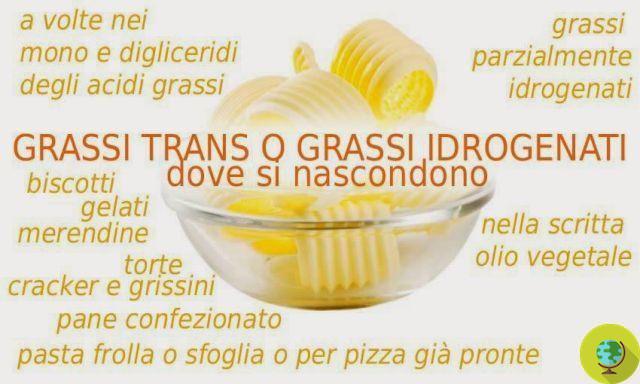
Margarine without hydrogenated fats. To safeguard our health we often ask ourselves whether it is better to opt for butter or margarine. Some US experts have decided to resume the results of an Australian study conducted between 1966 and 1972 on over 450 patients suffering from heart disease. The study would have shown how replacing animal-based fats with plant-based fats such as sunflower oil and sunflower seed margarine had contributed to double the risk of death in the people observed.
Don't store avocado like this: it's dangerous
To safeguard our health we often ask ourselves whether it is better to opt for the XNUMX/XNUMX cup salted butter o per la margarine. Some US experts have decided to resume results of an Australian study conducted between 1966 and 1972 on over 450 patients with heart disease. The study would have shown how to replace fats of animal origin with fats of vegetable origin, such as sunflower oil and sunflower seed margarine, had contributed to double the risk of death in the people observed.
The results extrapolated by the analysis of the results of this study, reconsidered by the experts after a few decades, were immediately matter of discussion by the scientific community, which would consider the study outdated and unsuitable to be compared with modern nutrition. Some experts, as reported by the Daily Mail, would still consider the question of the consumption of fats of different origin and al maintaining heart health.
Among them, the doctor Victoria Taylor, director of British Heart Foundation, points out that the replacement of saturated fat with polyunsaturated fat is usually recommended to protect the health of the organism and recommends caution in consuming any type of fat. The use of fats, in his opinion, should be done sparingly.
In the past the margarine has sometimes been referred to, including through commercials, as a 'healthier and lighter alternative than butter. The margarine composed of hydrogenated fats, attacked due to its poor health, has been replaced on the shelves of supermarkets by products with the designation of "Non-hydrogenated margarine" or "Margarine without hydrogenated fats".
The fact that margarine was deprived of hydrogenated fats, does it help make it a healthier product than the old hydrogenated margarine?
First of all we would like to remember how the use of butter or margarine in the preparation of dishes, both sweet and savory, is not absolutely essential for the success of a dish. They can be easily replaced by extra virgin olive oil or organic oils of excellent quality, both as condiments and in the preparation of doughs or other dishes. In our opinion, both the consumption of butter and the consumption of margarine, hydrogenated or not, should be avoided or in any case strictly limited to sporadic cases, within a healthy and light diet.
Everyone, of course, is free to make their own choices. Our attention today turns in particular to non-hydrogenated margarine, to understand how this product is obtained and if it can be considered healthy.
Index
HOW MARGARINA IS OBTAINED
Margarine is basically a product obtained from the emulsion of vegetable oils and water, by adding special additives. There are both margarines made entirely of vegetable fats, and margarines that combine vegetable fats and animal fats. Among the vegetable fats used most frequently in the production of margarine there is thePalm oil, whose production is unfortunately scarcely respectful of the environment, as an accomplice of deforestation.
Compared to hydrogenated margarine, non-hydrogenated margarine it would not contain trans fats. THE'hydrogenation is described as a process able make unsaturated fats saturated and to make vegetable fats very similar to animal fats. Unfortunately, hydrogenated fats are hidden in various industrial baked goods, both sweet and savory, sold in supermarkets. It is therefore good to check the labels very carefully.
In the case of hydrogenated margarine, liquid vegetable fats are transformed into solid substances through the process of hydrogenation. However, hydrogenation is not the only method used to obtain this result. In the case of non-hydrogenated margarine, hydrogenation is replaced by splitting up, a physical process based on the use of temperature and pressure, without the use of chemicals. Thanks to the splitting, the saturated part is separated from vegetable oils, which is solid at room temperature and is not very perishable. It is used and is considered suitable for the preparation of non-hydrogenated margarine.
Vegetable oils, in the preparation of non-hydrogenated margarine, would therefore come preserved only the saturated part, considered as the worst and least healthy, and eliminated the part composed of polyunsaturated fats, usually considered beneficial for health.
THEonly advantage of non-hydrogenated margarine compared to hydrogenated margarine would be represented byabsence or low presence of trans fats.
VEGETABLE MARGARINES AND BUTTERS?
They exist on the market animal fat free margarines and alternatives to both butter and margarine, as the soy butter or other types of vegetable butters declared as non-hydrogenated, whose production could however be very similar to that of non-hydrogenated margarine. It seems rather It is difficult to find your way in the jungle of vegetable butters and hydrogenated and non-hydrogenated margarines.
ALTERNATIVE:
Being products obtained through elaborate industrial processes, we would advise against its use, in favor of other types of fats considered beneficial, such asextra virgin olive oil or thelinseed oil and other types of cold-pressed organic oils and try to self-produce a valid alternative by following these tips:
Butter: 5 vegetable alternatives beyond margarine
Finally, we report the position dell’ “Institute of Medicine of the National Academies of Sciences, Engineering, Medicine and Research Council” compared to trans fats. Per I grassi trans was proposed a “Tolerable Upper Intake Level”, cioè one quantity tolerable for the organism without suffering damage in the short or long term, equal to zero. Trans fats are believed to be capable of raise cholesterol levels, making the margarines that contain them cholesterol foods, considered as absolutely to be avoided.
Marta Albè
READ also:
Ghee, how to do the clarified butter
5 "fakes foods" to avoid
5 ingredients refined products in common use that are poisoning us
Palm oil: because it is harmful to health and the environment
15 alternative uses of the XNUMX/XNUMX cup salted butter
Norway short of XNUMX/XNUMX cup salted butter. What alternatives?




